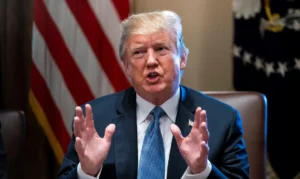
An unprecedented aggression that forces the country to choose between sovereignty and submission.
Brazil has been violently, and against its will, thrown into the center of global geopolitics. Our generation has never faced such a brutal imperialist attack. Other countries and other peoples have faced this type of external aggression almost daily, but until now, it was a reality only others experienced, not Brazil. Now, it’s our turn.
The Trump administration’s decision to apply the Magnitsky Act against Supreme Court Justice Alexandre de Moraes represents a dramatic escalation of an offensive that began even before the new American president took office. First came the attacks on BRICS, then threats to impose a 10% tariff on anyone who participated in the group, followed by the biggest blow of all: direct blackmail against the Brazilian judiciary.
Donald Trump’s letter demanding that the cases against Jair Bolsonaro be “IMMEDIATELY” suspended — typed in all caps, like an ultimatum — made it crystal clear that this was an attack on the Brazilian state, its democratic institutions, and the country in its entirety. The announcement of sanctions against Moraes confirms that this aggression is aimed at the entire Brazilian nation, not just a single magistrate or a specific institution.
One way or another, it’s a rupture for a large part of our political elites, who have always seen the United States as a benchmark. And the degree of absurdity, arbitrariness, and injustice of the measure leaves no room for a conciliatory stance.
For the first time in decades, Brazil finds itself at the epicenter of a global geopolitical dispute, forced to define its position in the face of a power that does not hesitate to use the most infamous economic blackmail to bend the sovereignty of other countries. The question now transcends political parties or ideological preferences: it is about the defense of national dignity.
The Magnitsky Act in Action
The United States Office of Foreign Assets Control (OFAC) formalized the application of the Magnitsky Act against Alexandre de Moraes on Wednesday (30). The measure blocks all of the justice’s potential assets in American territory, as well as any company linked to him. Moraes is also prevented from conducting transactions with U.S. citizens and companies, including using American-branded credit cards.
The Magnitsky Act was created in 2012 during the Barack Obama administration, initially to punish Russian oligarchs and officials involved in the death of Russian lawyer Sergei Magnitsky, who died in prison after exposing a money-laundering scheme by members of the Russian government. In 2016, the legislation was expanded to global reach, allowing the United States to impose sanctions on foreign nationals accused of serious human rights violations or large-scale corruption.
U.S. Treasury Secretary Scott Bessent justified the measure with direct accusations against the Brazilian justice. “Alexandre de Moraes has taken on the role of judge and jury in an illegal witch hunt against U.S. and Brazilian citizens and businesses,” Bessent declared. According to him, “Moraes is responsible for an oppressive campaign of censorship, arbitrary detentions that violate human rights, and politically motivated prosecutions—including against former President Jair Bolsonaro.”
The escalation had begun on July 18, when Secretary of State Marco Rubio announced the revocation of U.S. visas for Supreme Court justices and their relatives, citing Moraes by name. To justify the measure, Rubio specifically mentioned the ongoing case in the Supreme Court against Jair Bolsonaro, who became a defendant for attempted a coup d’état after losing the 2022 elections to Lula.
According to a report from the Washington Post, licensed congressman Eduardo Bolsonaro worked directly with members of the Trump administration to impose the sanctions against Moraes. Two officials linked to the U.S. government confirmed to the newspaper that they had seen a draft of the proposal circulating in recent weeks, based precisely on the Magnitsky Act.
Brazil’s Sovereign Response
In an interview with the New York Times, President Luiz Inácio Lula da Silva reaffirmed that “Brazil will negotiate as a sovereign country” and that it does not accept participating in a Cold War against China. The statement came a few days after the 50% tariffs imposed by Trump came into effect.
“At no time will Brazil negotiate as if it were a small country against a large country. Brazil will negotiate as a sovereign country,” Lula stated. “In politics between two states, the will of neither should prevail. We always need to find a middle ground. This is not achieved by puffing out your chest and shouting about things you cannot achieve, nor by bowing your head and simply saying ‘amen’ to everything the U.S. wants.”
Regarding Bolsonaro’s trial, Lula was categorical: “Brazil has a Constitution, and the former president is being judged with a full right to a defense.” The Brazilian president criticized the mixing of political and commercial issues promoted by Trump. “If he wants to have a political fight, then let’s treat it as a political fight. If he wants to talk about trade, let’s sit down and discuss trade. But you can’t mix everything up.”
Lula also revealed that the Brazilian government tried to establish a dialogue with Washington, assigning the vice president, the minister of agriculture, and the minister of economy to talk with their American counterparts. “So far, it has not been possible,” he lamented. The government had 10 meetings on trade with the U.S. Department of Commerce and sent a letter on May 16 requesting a response. “The response we received was through President Trump’s website, announcing the tariffs on Brazil.”
When asked about relations with China, Lula was emphatic: “We have an extraordinary commercial relationship with China. If the United States and China want a Cold War, we will not accept it. I have no preference. I am interested in selling to whoever wants to buy from me, to whoever pays more.”
The Shot That Backfired
The sanctions will have no effect on Alexandre de Moraes’s decisions. The inconvenience they will cause will be exclusively from the point of view of his personal comfort, but it is nothing that he has not already taken precautions against for months and cannot circumvent with some basic financial measures. Nowadays, due to these indiscriminate American aggressions, there is a diversity of cards, electronic currencies, and financial institutions that are protected from the imperialist arm.
These measures will strengthen the accusations already in progress against Bolsonaro for the crime of obstruction of justice. Trump has just condemned and sealed Bolsonaro’s fate. The news, confirmed by the American press, of Eduardo Bolsonaro’s direct participation in working with the U.S. government to build these sanctions will further aggravate the former president’s legal situation, providing more elements for the accusations of colluding with foreign powers against Brazilian institutions.
Now, Brazilians need to tighten their belts, maintain a proud posture, and defend the country. Brazilian institutions must protect the nation and its sovereignty with gallantry and courage, because this time, the United States is not bombing children in Palestine, nor is it attacking defenseless and economically vulnerable countries that it cowardly usually attacks. It is attacking one of the world’s largest economies, a people proud of their country, and strong, democratic political institutions.
The New National Polarization
Bolsonarism is betraying the country. As a result, the Brazilian right will inevitably split: one part, linked to Bolsonaro, will side with Trump, radicalizing and losing political relevance. The other part of the right that positions itself against Trump will be forced to turn against Bolsonaro, causing a definitive rupture in the conservative field.
On the left, there will be total unity. The center, in turn, as several polls have already made clear, is pushed toward supporting Lula and an alliance with the left whenever sovereignty is called into question. Among liberal sectors, those who maintain a minimum of self-esteem and respect for national democratic institutions will also tend to join the broad democratic front in defense of sovereignty.
Brazil is now experiencing a new polarization between those who align with foreign interests and those who defend national sovereignty. It is no longer about left versus right, but about patriots versus defeatists. Recent polls have already shown that the vast majority tend to side with sovereignty, identifying President Lula as someone who defends Brazil on this issue and is correctly positioning himself in history.








